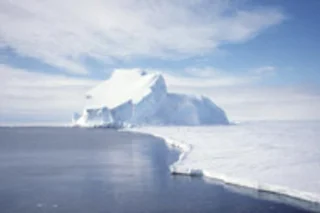The collapse of an ice sheet in West Antarctica would not only threaten coastal areas of North America and nations in the southern Indian Ocean, but would also cause a shift in the earth’s rotation axis, researchers report in Science. If the entire West Antarctic Ice Sheet (WAIS) collapses and melts, as some scientists feel is likely due to global warming, the earth’s rotation would shift an approximate 500 meters from its current position. Rather than cause a uniform rise in sea level, this would result in a 30 percent greater increase in certain areas—about 21 feet for Washington, D.C., for example, compared with the uniform 16 to 17 feet already predicted. The researchers say the melting would change the balance of the globe in much the same way that tsunamis move huge amounts of water from one area to another [ABC News]. Because the gravitational pull of an ice sheet on the ocean is reduced when it melts, water then moves away from it. The net effect is that the sea level actually falls within 2,000 km of a melting ice sheet, and rises progressively further away from it. If the West Antarctic Ice Sheet collapses, sea level will fall close to the Antarctic and will rise much more than the expected estimate in the northern hemisphere because of this gravitational effect [Science Daily]. In addition the sheer weight of ice is forcing down the land underneath it and having an impact on the Earth’s spin. When the ice is removed up bounces the land and the Earth moves [Nature]. No need to panic about drowning next week, however. It's a time scale of hundreds of years [Reuters], said Jerry X. Mitrovica, one of the authors of the study. If you really want a preview, digital animation is available to see what potential scenarios of changes in sea level would look like. Related Content: 80beats: Antarctica Is Definitely Feeling the Heat From Global Warming 80beats: Emperor Penguins May Be Marching to Extinction by 2100Image: Ben Holt Sr. / NASA
Antarctic Ice Melt Would Shift Earth's Axis, Further Changing Sea Level
The West Antarctic Ice Sheet collapse could trigger major sea level rise and shift Earth's rotation axis, impacting coastal regions.
More on Discover
Stay Curious
SubscribeTo The Magazine
Save up to 40% off the cover price when you subscribe to Discover magazine.
Subscribe













